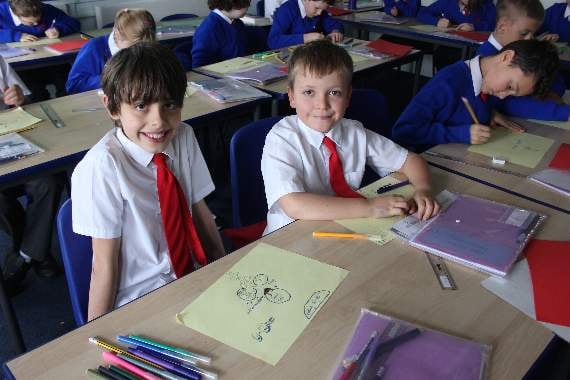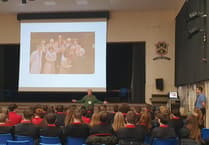Whitchurch CE Primary School pupils have being learning all about asylum seekers and refugees, as part of their Unicef Rights and Respecting Schools Award, which is all about children knowing they have got rights and responsibilities.
The children were visited by Amy Whiles, a Refugee and Asylum Seeker Co-ordinator for Herefordshire Council.
The Rights and Respecting Schools council, of mixed ages, sat with Amy, and came up with ideas to help refugees, like donating clothes. Amy told the pupils that only “1% of refugees get somewhere to go, and it is the other 99% that need the warm clothes.”
The Whitchurch council pupils were very passionate, particularly insisting that refugees need to be given “names not numbers.” One pupil said sadly: “If you’re a number, you’re nothing, you’re nobody.”
They also covered the topic of prejudice, which the pupils were confident at explaining. “It is ‘don’t judge a book by its cover.’” Amy added that, “it is when you are judged by your outer self, or when you make a decision about somebody.”
The year six pupils in Willow Class were using laptops to learn more online at refugee-action.org.uk and to write letters to MP Jesse Norman. The letters were to ask Jesse to help to allow refugees to bring their families over.
The Maple Class, year five, and half of year four, were learning about challenging the media. One pupil pointed out that every refugee-related headline on national front page newspapers is negative.
Deputy Headteacher, Mrs Beth Stevens said: “It is about getting the children to empathise and to challenge misinterpretations.”
The Rowan Class, year three and the other half of year four, were discussing the differences between terrorists and asylum seekers, and also how it is used negatively in the media. The pupils said how “asylum seeker sounds like a bad thing but it’s not.”
They also discussed prejudice and the 60 refugees in Herefordshire, and the pupils said that “they’re just trying to keep other members of their family safe.”
Year six Maths teacher, Mr Colin Mutton, told an emotive story to the children, of a little girl called Anita who lived in Germany in 1945, and whose father was captured and became a prisoner of war.
Mr Mutton went on to say that Anita and her family could hear the Russians coming, and packed up their belongings in wheelbarrows. They walked and walked, slept on the side of the road, ate whatever they could pick from fields, and hid in barns, until they got to a safe part of Germany.
Their father was released as a prisoner and found his family, and they started a new life.
When Anita grew up, she wanted to be a nurse, and planned to study abroad, choosing to move to England.
Mr Mutton ended the story by saying that, “In England, Anita then had a child, and that child was me. My mum was a German refugee.”
The pupils loved his personal story, responding with gasps of shock and amazement.





Comments
This article has no comments yet. Be the first to leave a comment.